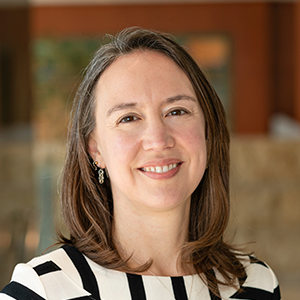Sometimes, the best way to understand an idea is to meet the people who devote their time and energy to studying it.
The Institute’s mission to conduct and promote research that will advance economic opportunity and inclusive growth for all Americans means engaging with a diverse group of scholars who approach opportunity and inclusion from many angles. This series of short Q&As spotlights those individuals, what led them to economics, and how their research connects to opportunity and inclusion. Plus: the most useful ideas in economics, abandoned projects, podcasts, and economists to lunch with.
For this installment, Institute Writer Lisa Camner McKay sat down with Mathematica Researcher Marina Mileo Gorzig to discuss unintended consequences of well-meaning policies, sources of discrimination in housing, and prioritizing the things that matter most.
What made you decide to study economics?
When I was in college, I was originally going to major in Spanish. I went to a small liberal arts college and I studied abroad in Mexico. As part of the program, we did ethnographic studies where we each picked a part of Mexican culture to spend about 10 hours a week at, and I was at a traditional market stall in Cuautla, Morelos. I became really interested in the commercial activity at the stall. Who was buying what? How much was the owner of the stall paying to buy his goods, and how much was he selling for? I even went with him to some of his producers—sometimes he was buying directly from farmers and sometimes he was buying from intermediaries.
This got me really interested in economics, and so I started taking more econ classes. Then I got my master’s degree in econ. I did my Ph.D. in public policy with a concentration in econ. It was a very fun Ph.D. program. I took mostly economics classes, but I also took sociology, political science, and of course policy classes.
As a result, a lot of my research is very interdisciplinary. I think a lot of folks at the Opportunity & Inclusive Growth Institute are very interested in questions of inequality, and those questions really span disciplines.
What do you think is one of the most useful ideas in economics?
There’s a concept called stratification economics. Often, economics focuses on individual interactions, even when we’re studying discrimination. For instance, an individual landlord might be prejudiced or hold stereotypes, and as a result, they discriminate against a potential renter from a different racial or ethnic group.
What stratification economics does is zoom out and ask, what are the structural barriers that are causing inequality? What systems or institutions are being set up—by governments or by informal social structures—that are fundamentally causing some of these inequalities?
Maybe that prejudiced landlord is acting in a way to preserve power for other prejudiced landlords. In that sense, their actions aren’t just individual interactions—they are contributing to a broader source of social power.
What economist, living or deceased, would you want to have lunch with and why?
I’ll say Gary Becker, because I often study discrimination and he was one of the first people to really take questions of discrimination and put them into a traditional economics framework. For example, showing how we can model discrimination with traditional utility functions—predicting what would happen in the labor market if a segment of employers, co-workers, or customers are prejudiced. I think we’d disagree on some things of course, but it would be an interesting lunch!
What are you studying now?
This summer, my awesome co-author Deborah Rho and I have been looking at the impact of a recent policy in Minneapolis that was passed to reduce housing discrimination. The policy is really well intended—it basically makes it harder for landlords to do certain types of background checks and credit history checks, impose strict income requirements, or require more than a certain amount for a security deposit. So the intention is to lower barriers to accessing rental housing.
But there’s some concern that similar policies in the labor market—such as prohibiting employers from asking about a person’s criminal record—have had an unintended consequence of increasing discrimination based on a person’s race or ethnicity. If employers can’t get information on an individual applicant, they may end up relying more on stereotypes—inadvertently increasing discrimination. And so we wanted to see whether or not that happened in the housing market.
What we did is submit fictitious inquiries from names that sounded White American, Somali American, or African American to publicly listed housing ads before the policy passed and then after the policy passed. And we did this in Minneapolis as well as in St. Paul and the suburbs, which didn’t have this new policy. So we’re able to look within Minneapolis at what happened before and after the policy, and then also compare Minneapolis to St. Paul and the suburbs.
What we find is that discrimination increased quite substantially against Somali American and African American men in particular in Minneapolis, but not St. Paul or the suburbs. So unfortunately, there was an unintended consequence of a really well-intended policy.
What do you plan to study next?
There’s a couple of different things. Deborah and I want to follow up this project by looking more broadly at the determinants of housing discrimination. For instance, what is the impact of racial covenants? Those were real estate deeds that specified, this property has to be sold to a White person. Racial covenants are a great example of stratification economics, in fact—they were a formal, institutionalized way that White people segregated cities, but less obvious than Jim Crow laws. And they had a massive effect on housing segregation in Minneapolis. So we know they impacted home ownership, but did they have spillover effects on the rental housing market too? Do they still impact rental housing discrimination today?
Another project looks at the relationship between extraction industries, such as fracking and gas pipeline construction, and mortality among Native American women in particular, but also men. This work is with Donn Feir, Randy Akee, and Sam Myers Jr. We’ve done previous research that found that when you have lopsided sex ratios among White people—when you get a lot of extra White men in an area—Native American women die at younger ages and Native American men die more often from murder. So we’re digging more into that. Many Indigenous women activists point to pipeline building and fracking as creating “man camps” that lead to a lot of sexual violence. That might be what we are picking up with lopsided sex ratios and mortality.
How does your research relate to economic opportunity and inclusion?
I think housing is an absolutely essential part of somebody’s economic life. Where you live determines so many things about what schools your kids can go to, what jobs you have easy access to, your housing. And it’s an important part of your own health, your own well-being.
What’s an important economic statistic that you think people should know, or one that surprised you?
One of the things that I think is striking is comparing Black-White differences in income to Black-White differences in wealth. Black Americans earn about 50 cents for every dollar White Americans earn, but they have about only 17 cents of wealth for every dollar of White wealth. I think often conversation focuses mostly on income, which is really important. But so is wealth, which I think ties to the housing question, because housing is an important way that we transfer wealth across generations. And the wealth gap doesn’t disappear if you just look at households with college education, post-college degrees, or things like that. We still have massive, massive differences in wealth.
Do you have a project you’ve decided to abandon at some point along the way, and if so, why?
I have abandoned many projects! It happens if I start looking at something and I think there’s going to be something there, and there’s just not. Or sometimes the data just doesn’t work—it doesn’t have quite what I need to get at the question, which is always frustrating. I think that’s part of why I started to do more field experiments, which give researchers more control over what information the data contain. You can design the experiment in a way so that you determine what variables are changing.
If I have to think of a specific project, I remember working on a project that was looking at regional differences in LGBT mortality. Previous research has shown that LGBT people in less prejudiced areas live longer the LGBT people in more prejudiced areas. I was curious about how much of this is from selective migration—that is, LGBT people with more resources choosing to move out of prejudiced areas while those who don’t have the resources to move out are more likely to stay in highly prejudiced areas. But I didn’t have fine enough geography data at the time to answer the question well.
Do you have a favorite podcast?
I do. It’s not econ-related.
Even better.
I have ADHD and I listen to Translating ADHD. It’s a really great podcast all about understanding how your brain works and how to lean into your strengths.
What is the best piece of advice you’ve received or read?
This is something that I use a lot. Let’s see how well I can describe this. Say you’ve got a bunch of rocks. You’ve got big rocks, medium rocks, gravel, and sand, and you’re trying to fit it all in a jar. If you put the sand in first and then you try to fit your big rocks in, it won’t fit. But if you put your big rocks in, then you put your smaller rocks in around them, then you put your gravel in, then you put your sand in, it’ll all fit, right? This is something that I learned when I was a kid that has always really stuck with me. Figure out what your big, important pieces in your life are, and then everything else you can fit in around that.
If you could live anywhere, where would it be?
You know, that is a question that I struggled with a lot when I was finishing my Ph.D. But I concluded it’s Minneapolis—and that’s why I’m here in Minneapolis.
Why Minneapolis?
I’m from Minnesota so I have family connections. I met my wife here and she has also strong family ties here. We just love Minnesota. We love Minneapolis. Although sometimes we flirt with the idea of Duluth …
If you could do any career for a day other than economist, what would it be?
I have always secretly wanted to be one of the people who climbs really tall trees to trim them, take care of them. It looks like so much fun.
Lisa Camner McKay is a senior writer with the Opportunity & Inclusive Growth Institute at the Minneapolis Fed. In this role, she creates content for diverse audiences in support of the Institute’s policy and research work.





